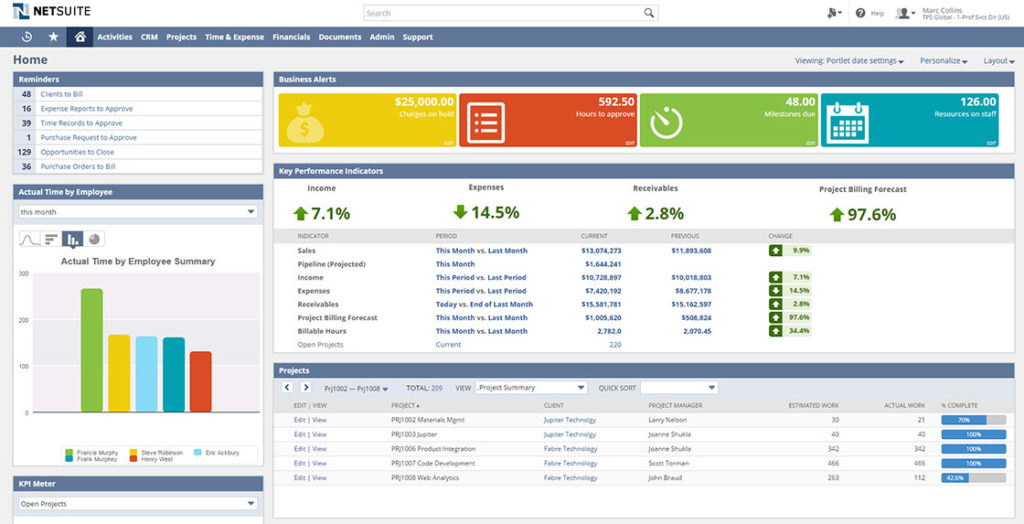- CALL : (+1) 407-273-1001
- Main Office : (+1) 407-273-1001
What is NetSuite?
NetSuite is a cloud-based suite of enterprise-grade business management tools all managed under one excellent platform. NetSuite’s core functionality is built around enterprise resource planning (ERP). In addition, it has since expanded into a number of different product offerings throughout the years including: CRM, HRM, eCommerce, PSA, and more.
What is an ERP and Why Use a Cloud-Based ERP?
So let’s back up and start at the beginning.
An enterprise resource planning (ERP) system is a software platform that helps businesses manage and integrate their core business processes, such as financials, supply chain, manufacturing, and human resources. ERP systems provide a central repository of information that can be accessed and shared by different departments and team members within an organization.
ERP systems are designed to support the efficient and effective operation of a business by automating and streamlining various processes, such as accounting, inventory management, and order processing. They can also provide real-time data and insights that can help businesses make more informed decisions and better understand their operations.
ERP systems are commonly used by medium to large businesses, and can be implemented on-premises or as a cloud-based solution. Some popular examples of ERP systems include SAP, Oracle, Acumatica and, of course, Oracle NetSuite.
Why Would You Want to Use an ERP?
- Improved efficiency: An ERP system can automate and streamline various business processes, reducing the time and effort required to complete tasks and freeing up resources to focus on more important tasks.
- Enhanced decision-making: An ERP system can provide real-time data and insights that can help businesses make more informed decisions.
- Increased collaboration: An ERP system can facilitate communication and collaboration between departments and team members, promoting a more cohesive and integrated work environment.
- Greater flexibility: An ERP system can be customized to meet the specific needs and goals of a business, and can be easily scaled up or down as needed.
- Reduced costs: An ERP system can help businesses reduce operational costs by streamlining processes, eliminating the need for manual data entry, and reducing the risk of errors and discrepancies.
Cloud ERP’s and Their Benefits
A cloud-based enterprise resource planning (ERP) system is a software platform that is hosted and delivered via the internet, rather than being installed and run on a business’s own servers. This means that businesses can access the ERP system from anywhere with an internet connection, rather than being tied to a specific location.
There are several benefits to using a cloud-based ERP system:
- Cost savings: With a cloud-based ERP system, businesses don’t need to invest in expensive hardware and software infrastructure. They can instead pay a subscription fee to access the system, which can be more cost-effective in the long run.
- Scalability: Cloud-based ERP systems can be easily scaled up or down to meet the changing needs of a business. This can be especially useful for businesses that experience fluctuations in demand or are experiencing rapid growth.
- Flexibility: Cloud-based ERP systems can be accessed from anywhere with an internet connection, which makes it easier for businesses to work remotely or to collaborate with team members in different locations.
- Security: Cloud-based ERP systems often have strong security measures in place to protect sensitive business data.
- Integration: Cloud-based ERP systems can easily integrate with other business applications, such as customer relationship management (CRM) and supply chain management (SCM) systems, allowing for a more seamless workflow.
So Why is NetSuite Popular?
Now that we know what ERP and cloud-based ERP tools are and why their benefits, we can begin to look at what makes NetSuite such a special cloud-based ERP tool.
NetSuite is more than just the flavor of the year ERP tool. You can argue NetSuite began the cloud revolution that is currently sweeping through offices around the globe. NetSuite’s accession to the top of the pack is based on disrupting the old status quo and changing the way people do business for the foreseeable future.
This sense of disruption has stayed with the organization and to this day, pushes them to be the leading edge of business software technology.
So after 20 years of successfully convincing the public that the cloud is the way forward, NetSuite has climbed to the top of the pile as the number one ERP solution available today, but what specifically does it owe this success to?
NetSuite Benefits
1. All-in-one solution: NetSuite offers a wide range of business management capabilities in a single system, including accounting, CRM, e-commerce, inventory management, and more. This can help businesses streamline their operations and improve efficiency.Of course! Log in from anywhere, no server maintenance, secure, reliable, and can grow with you.
2. Scalability: NetSuite can be easily scaled up or down to meet the changing needs of a business, making it a good choice for businesses that experience fluctuations in demand or are experiencing rapid growth.
3. Customizable: The platform has many development options and a community of third-party developers that build dozens of “bundles” available for NetSuite users.
4. Integratabtle: NetSuite can connect to most other applications, databases, public and private API’s
5. User-friendly interface: NetSuite has a user-friendly interface that makes it easy for employees to navigate and use the system, reducing the learning curve and improving productivity.
6. Mobile accessibility: NetSuite can be accessed from mobile devices, allowing employees to stay connected and work remotely.
7. Advanced reporting and analytics: NetSuite provides advanced reporting and analytics capabilities that can help businesses track key performance indicators, identify trends and patterns, and make more informed decisions.
8. Industry-specific functionality: NetSuite offers industry-specific functionality that is tailored to the needs of specific sectors, such as retail, manufacturing, and healthcare.
10. UI – NetSuite’s dashboard setup spoils administrators with critical information elegantly and optimally displayed visually
NetSuite Accounting/ERP Functionality
NetSuite is sold in packages that are groups of department-specific features together that are commonly refereed to as modules. NetSuite’s most common package is its ERP package. It contains the following modules and included functionality (please note that the following list may not contain all of the features included in this package.)
Accounting/Finance
- General ledger: NetSuite provides a central repository for financial data, including account balances, transactions, and budgets.
- Accounts payable: NetSuite automates the process of paying bills and tracking vendor payments, including the creation of purchase orders and the recording of invoices.
- Accounts receivable: NetSuite helps businesses manage their accounts receivable, including the creation of invoices, the tracking of customer payments, and the management of collections.
- Bank reconciliation: NetSuite allows businesses to reconcile their bank accounts with their financial records, ensuring that transactions are properly accounted for and discrepancies are identified.
- Financial reporting: NetSuite provides a range of financial reports, including balance sheets, income statements, and cash flow statements, to help businesses track their financial performance and make informed decisions.
- Cash Management: Allows you to manage your company’s cash flow, including bank account reconciliation and forecasting.
- Budgeting: Allows you to create and track budgets, compare actual results to budgeted amounts, and analyze variances.
- Fixed Asset Management: Allows you to track and manage your company’s fixed assets, including depreciation calculations and asset disposals.
- Revenue Recognition: Allows you to manage and recognize revenue in accordance with accounting standards, including support for the new revenue recognition standards (ASC 606 and IFRS 15).
- Multi-Currency: Allows you to conduct financial transactions in multiple currencies and automatically converts between them using current exchange rates.
- Audit Trail: Provides a comprehensive record of all financial transactions, making it easy to track changes and perform audits.
- Tax calculation: NetSuite can automatically calculate and apply appropriate tax rates to transactions based on the location of the customer or vendor and the type of goods or services being purchased.
- Tax reporting: NetSuite can generate tax reports, such as sales tax reports and VAT reports, to help businesses meet their reporting obligations.
- Tax compliance: NetSuite can help businesses stay up-to-date with changing tax laws and regulations, and can alert businesses to potential compliance issues.
- Tax filing: NetSuite can assist with the preparation and filing of tax returns, including the submission of electronic tax forms.
NetSuite Inventory Management
- Item Management: Allows you to create and manage your company’s inventory items, including item numbers, descriptions, pricing, and images.
- Inventory Management: Allows you to track and manage your company’s inventory levels, including reordering and replenishment.
- Bin Management: Allows you to track and manage inventory within specific storage locations (bins) within a warehouse.
- Lot and Serial Number Tracking: Allows you to track and manage inventory using unique lot or serial numbers.
- Drop Shipments: Allows you to manage and track orders that are fulfilled directly by vendors.
- Intercompany Transactions: Allows you to track and manage inventory movements between different entities within your company.
NetSuite Order Management
- Order Entry: Allows you to create and manage customer orders, including creating quotes, entering orders, and processing returns.
- Order Fulfillment: Allows you to manage the fulfillment process for customer orders, including picking, packing, and shipping.
- Returns Management: Allows you to manage and track customer returns, including processing returns and issuing credits or replacements.
- Customer Management: Allows you to track and manage customer information, including contact details, order history, and customer notes.
- Pricing and Discounting: Allows you to create and manage custom pricing and discounting rules for your products and services.
- Quotes and Proposals: Allows you to create and manage quotes and proposals for potential customers.
- Subscriptions: Allows you to manage recurring orders and subscription billing.
- Customer Self-Service: Provides a customer portal that allows your customers to place orders, track shipments, and view their order history.
Purchasing and Receiving
- Purchase order creation: The module allows users to create and manage purchase orders for items and services.
- Vendor management: Users can manage vendor information, including contact details, payment terms, and preferred shipping methods.
- Inventory management: The system includes tools for tracking inventory levels, replenishing stock, and managing demand forecasts.
- Receiving goods: Users can track the receipt of goods and compare them to the original purchase order to ensure accuracy.
- Invoicing and payment: The module includes tools for managing invoices and payments, including integration with financial software.
NetSuite Project Management
- Project planning and scheduling: Users can create and manage project schedules, including tasks, resources, budgets, and milestones.
- Resource management: The module includes tools for managing and allocating resources, including personnel, equipment, and materials.
- Budget tracking: Users can track project budgets, including actual costs and variances from the original budget.
- Time and expense tracking: The system includes tools for tracking time and expenses, including integration with time sheets and expense reports.
- Collaboration: The module includes tools for collaborating with team members, including communication, file sharing, and task assignments.
- Task dependencies: The module may allow users to specify dependencies between tasks, such as one task being dependent on the completion of another task.
- Risk management: Users may be able to identify and manage risks associated with projects, including the ability to assign risk owners and create risk mitigation plans.
- Change management: The module may include tools for tracking and managing changes to projects, including the ability to create change requests and track their approval process.
- Document management: Users may be able to store and manage project-related documents, including contracts, proposals, and specification sheets.
- Project templates: The module may allow users to create and use templates for common types of projects, making it easier to set up new projects.
Employee Management
- Employee records: The module allows users to create and manage employee records, including personal and professional information, job titles, and salary details.
- Time and attendance tracking: Users can track employee time and attendance, including clocking in and out, scheduling shifts, and managing time off requests.
- Payroll: The module includes tools for calculating and issuing employee pay, including integration with payroll tax and benefits systems.
- Performance management: Users can create and manage employee performance evaluations, including setting goals, tracking progress, and providing feedback.
- Talent management: The module may include tools for recruiting and onboarding new employees, as well as managing employee training and development.
- Policy and compliance: The system may include tools for managing employee policies and compliance with laws and regulations, such as equal employment opportunity and workplace safety.
Popular NetSuite Modules and Add-Ons
NetSuite has added many “modules” to their offering since inception. Each module expands on the functionality of NetSuite while keeping the data and back-end completely integrated. Modules are sold separately or added in specific packages that can be put together for you based on your needs. For a complete list of all NetSuite modules and more info on what they can do for your business, click HERE.
NetSuite CRM
NetSuite’s Customer Relationship Management (CRM) module is a tool for managing customer interactions and data. It includes a variety of features to help businesses automate and streamline their sales, marketing, and customer service processes.
Some key features of NetSuite’s CRM module include:
- Contact and lead management: Users can create and manage records for contacts and leads, including personal and professional information, communication history, and sales stages.
- Sales forecasting: The system includes tools for creating and tracking sales forecasts, including the ability to set targets and measure performance against them.
- Opportunity management: Users can create and manage opportunities, including the ability to track the status of deals and the likelihood of closing.
- Account management: The module allows users to create and manage accounts, including tracking customer interactions, purchases, and support tickets.
- Marketing automation: The system includes tools for automating marketing campaigns, including email marketing, lead nurturing, and social media marketing.
- Customer service: The module includes tools for managing customer service requests, including the ability to track and resolve issues and create knowledge base articles.
NetSuite eCommerce (SuiteCommerce)
NetSuite SuiteCommerce is a e-commerce platform designed for businesses of all sizes. It includes tools for creating and managing an online store, including website design and management, product listings, order management, and customer management.
Some key features of NetSuite SuiteCommerce include:
- Website design and management: The platform includes tools for creating and managing an e-commerce website, including templates, customization options, and the ability to manage content and images.
- Product listings: Users can create and manage product listings, including descriptions, images, pricing, and inventory levels.
- Order management: The system includes tools for managing orders, including the ability to capture orders from various channels, route orders to the appropriate fulfillment location, and track the status of orders throughout the fulfillment process.
- Customer management: The platform allows users to create and manage customer records, including personal and professional information, communication history, and purchasing history.
- Marketing automation: The system includes tools for automating marketing campaigns, including email marketing, lead nurturing, and social media marketing.
- Reporting and analytics: SuiteCommerce includes a variety of reports and analytics tools to help businesses track e-commerce performance and customer interactions.
- Integration with other systems: NetSuite SuiteCommerce is natively integration with other NetSuite modules, such as CRM and financial software, to provide a comprehensive view of customer data and interaction
For more information on this topic, check out our guide “What is SuiteCommerce”
NetSuite WMS (Warehouse Management)
NetSuite Warehouse Management System (WMS) is a module designed to help businesses manage and optimize their warehouse operations. It includes a variety of tools to help businesses streamline their receiving, storage, and shipping processes, and improve accuracy and efficiency.
Some key features of NetSuite WMS include:
- Receiving: The module includes tools for managing the receipt of goods, including the ability to track and verify incoming shipments, create and manage purchase orders, and generate receiving reports.
- Putaway and storage: Users can create and manage storage locations within the warehouse, including the ability to specify storage rules and optimize the use of space. The system includes tools for managing the putaway process, including the ability to track the location of goods within the warehouse.
- Picking and packing: The module includes tools for managing the picking and packing process, including the ability to create and manage pick lists and packing slips, and track the progress of orders.
- Shipping: The system includes tools for managing the shipping process, including the ability to create and manage shipping labels and documents, track shipping costs, and manage carrier relationships.
- Inventory management: The module includes tools for tracking inventory levels, replenishing stock, and managing demand forecasts.
NetSuite Manufacturing
NetSuite’s manufacturing module is a comprehensive tool for managing the production process, from raw materials to finished goods. It includes a variety of features to help businesses optimize their manufacturing operations and improve efficiency.
Some key features of NetSuite’s manufacturing module include:
- Bill of materials (BOM) management: The module includes tools for creating and managing BOMs, which are lists of the materials and components needed to manufacture a product. Users can specify the quantities and units of each item, as well as any assembly or manufacturing instructions.
- Work order management: The system includes tools for creating and managing work orders, which are instructions for the production of a specific product or batch of products. Users can specify the materials and resources needed, as well as the steps and processes involved in the production process.
- Inventory management: The module includes tools for tracking inventory levels, replenishing stock, and managing demand forecasts.
- Capacity planning: Users can create and manage capacity plans to ensure that the production process has sufficient resources and capacity to meet demand.
- Quality control: The system includes tools for managing quality control processes, including the ability to track and document defects, conduct inspections, and generate quality reports.
NetSuite OneWorld
NetSuite OneWorld is a comprehensive platform that includes tools for managing global operations, including multi-currency and multi-language support, tax management, and global shipping options. It is suitable for businesses with complex international operations.
Some key features of NetSuite OneWorld include:
- Multi-currency and multi-language support: OneWorld includes tools for managing transactions and customer interactions in multiple currencies and languages, including the ability to set exchange rates and translate content.
- Tax management: The platform includes tools for managing taxes, including the ability to specify tax rates and rules for different countries and regions, and to track and report on tax payments and liabilities.
- Global shipping options: OneWorld includes tools for managing global shipping, including the ability to create and manage shipping labels and documents, track shipping costs, and manage carrier relationships.
- Subsidiary management: Users can create and manage subsidiaries, including the ability to track financial data, operations, and customer interactions for each subsidiary.
- Consolidated reporting: The module includes tools for generating consolidated financial reports for all subsidiaries, making it easier to track and analyze global operations.
- Country-specific features: OneWorld includes a variety of country-specific features, such as support for VAT in the European Union and GST in Australia.
NetSuite OpenAir
NetSuite OpenAir is a project management and professional services automation (PSA) platform that includes tools for managing projects, resources, and financials. It is designed for businesses in the consulting, technology, and professional services sectors.
Some key features of NetSuite OpenAir that are specific to that module include:
- Project management: OpenAir includes tools for managing projects, including the ability to create and track project schedules, tasks, resources, budgets, and milestones.
- Resource management: The platform includes tools for managing and allocating resources, including personnel, equipment, and materials.
- Time and expense tracking: Users can track time and expenses, including the ability to create and approve time sheets and expense reports.
- Financial management: The module includes tools for managing financial aspects of projects, including invoicing, billing, and revenue recognition.
- Collaboration: OpenAir includes tools for collaborating with team members, including communication, file sharing, and task assignments.
NetSuite Payroll
NetSuite Payroll is a module designed to help businesses manage employee payroll and benefits. It includes a variety of features to help businesses automate and streamline their payroll processes.
Some key features of NetSuite Payroll include:
- Payroll processing: The module includes tools for processing employee payroll, including the ability to calculate and distribute paychecks, track deductions and contributions, and manage employee tax information.
- Benefits management: Users can manage employee benefits, including the ability to enroll employees in benefit plans, track benefit usage, and calculate benefit costs.
- Time and attendance tracking: The system includes tools for tracking employee time and attendance, including the ability to create and approve time sheets and track paid time off.
- Payroll tax compliance: The module includes tools for managing payroll tax compliance, including the ability to calculate and file payroll tax returns, and track and report on tax payments and liabilities.
- Employee self-service: Employees can access their payroll and benefits information and make updates through an employee self-service portal.
- Mobile access: Users can access the Payroll module from a mobile device, including the ability to approve time sheets and enter payroll data on the go.
NetSuite ERP SuiteSuccess
NetSuite SuiteSuccess is version of NetSuite that is designed for small and medium-sized businesses. It provides a range of tools and features for managing financials, operations, and customer relationships, and is tailored to the specific needs of small and medium-sized businesses.
SuiteSuccess includes pre-configured business processes, industry-specific functionality, and best practices that are designed to help small and medium-sized businesses get up and running with NetSuite quickly and easily. It also includes support and training to help users get the most out of the software and achieve their business objectives.
SuiteSuccess is a turnkey solution that is designed to be easy to implement and use, and it can be customized to meet the specific needs of a business. It is designed to help small and medium-sized businesses streamline their operations, improve their financial management, and better serve their customers.
SuiteCloud Platform
Before we continue, I think it’s important to discuss the SuiteCloud platform. The SuiteCloud platform is the environment that all of the features and functionality we previously discussed were built on.
It’s important to look at this as its own feature because as a NetSuite user you can use the platform to extend the usefulness of the NetSuite ERP as well as compare the platform NetSuite uses to other ERP platforms. No two ERP platforms are the same and they can be the difference in things like customization options, configuration, security, integration, and ease of use.
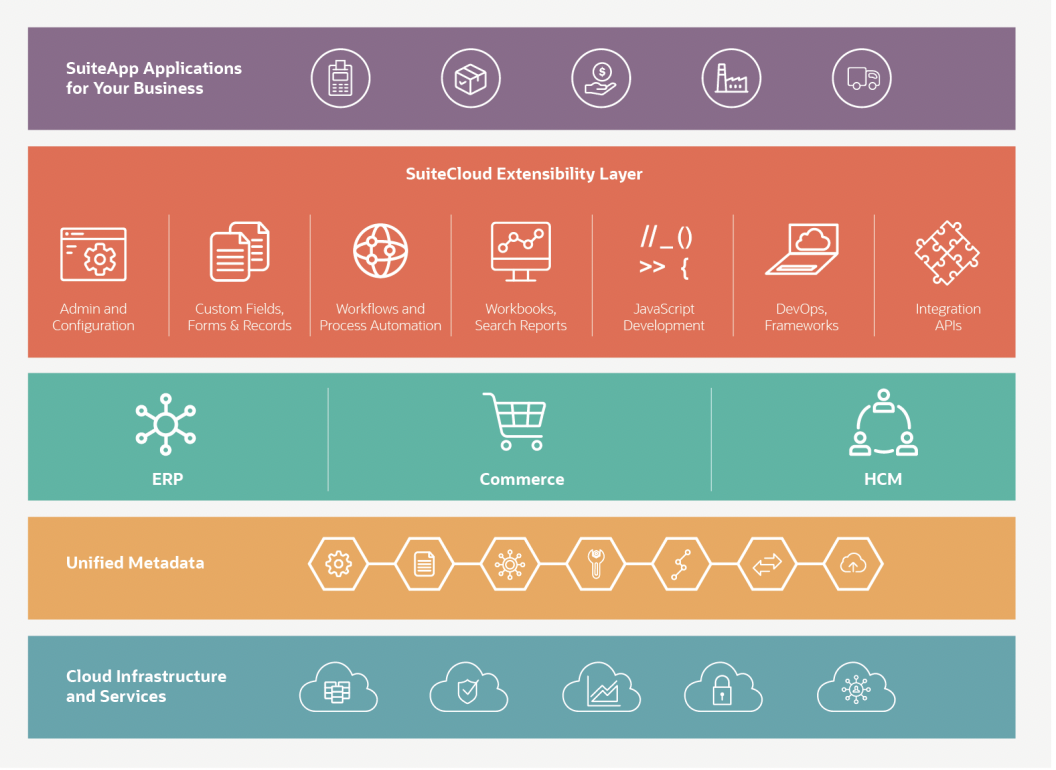
Here is a visualization of the platform. As you can see, the platform includes a lot more than just the features we discussed in the modules section. For more information on the SuiteCloud platform, I recommend you check out this page as well as this datasheet. For now let’s discuss some of the most important features of the SuiteCloud platform.
Oracle NetSuite Analytics
NetSuite Analytics is a feature of the NetSuite SuiteCloud platform that allows users to create custom reports and dashboards to track key performance indicators (KPIs) and make data-driven decisions. With NetSuite Analytics, you can access real-time data from across your business, including financial data, sales data, customer data, and operational data.
Some of the main features of NetSuite Analytics include:
- Custom reports: You can create custom reports to display data in a variety of formats, including tables, charts, and graphs. You can also schedule reports to be automatically generated and delivered to specific users on a regular basis.
- Dashboards: You can create custom dashboards to display real-time data in a visual format, such as charts, graphs, and gauges. Dashboards can help you quickly and easily track key performance indicators and make data-driven decisions.
- Data visualization: NetSuite Analytics includes a range of visualization options, including pie charts, bar charts, line graphs, and more. You can use these visualizations to make data more meaningful and easier to understand.
- Data filtering and sorting: You can filter and sort data in NetSuite Analytics to focus on specific sets of data or to find specific information.
- Collaboration: You can share reports and dashboards with other users, and collaborate on data analysis in real-time.
NetSuite ERP Customization
One of the best features of the SuiteCloud platform is how it allows NetSuite to be customized. It is important to distinguish customization from configuration for this discussion so I will define these to words for you now.
For the purposes of this discussion:
- Customization – refers to anything that will require scripting or a third party application to modify or enhance the NetSuite platform.
- Configuration – Refers to anything that is natively included with the SuiteCloud platform that allows you to enhance and tailor the NetSuite platform to your specific needs. Examples are using NetSuite’s form builder or workflow automation features, custom reports, and custom fields.
This section will only be discussing ways in which the SuiteCloud platform allows you to customize the platform for your unique needs. Before we get into the different ways you can customize NetSuite, I want to mention here that customizing NetSuite should be looked at as a last resort. If there is a NetSuite module or a third-party add-on available it is usually suggested to pursue that path as opposed to creating your own customization. That said, here are the ways you can customize NetSuite:
SuiteScript
SuiteScript is a JavaScript-based programming language that is used to customize and extend the functionality of the NetSuite platform. With SuiteScript, you can create custom scripts that automate business processes, integrate with other systems, and customize the user experience.
There are several types of SuiteScripts, including:
- User event scripts: User event scripts are triggered by specific actions within NetSuite, such as creating a new record or saving a form. You can use user event scripts to automate processes, validate data, or perform custom actions.
- Scheduled scripts: Scheduled scripts are scripts that are automatically run on a regular basis, such as daily, weekly, or monthly. You can use scheduled scripts to perform periodic tasks, such as generating reports or sending emails.
- Client scripts: Client scripts are scripts that run in the client’s web browser and can interact with the user interface. You can use client scripts to customize the look and feel of your NetSuite account or to add custom functionality to forms and pages.
- Map/reduce scripts: Map/reduce scripts are used to process large sets of data in a distributed manner. They can be used to perform complex calculations, data transformations, or data integrations.
Oracle NetSuite Integration API’s
NetSuite integration refers to the process of connecting NetSuite with other systems, such as your accounting software, customer relationship management (CRM) system, or e-commerce platform. Integrating NetSuite with other systems can help you automate business processes, exchange data, and streamline your operations.
There are several ways you can integrate NetSuite with other systems, including:
- Using NetSuite’s native integration tools: NetSuite offers a range of integration tools, such as the NetSuite Connector and the NetSuite Web Services API, that allow you to connect NetSuite with other systems.
- Using third-party integration solutions: There are a number of third-party solutions that can help you integrate NetSuite with other systems, such as integrations developed by NetSuite partners or independent software vendors (ISVs).
- Using custom integration solutions: You can develop custom integration solutions using tools such as SuiteScript or SuiteFlow. This requires technical expertise and programming skills, and may be suitable for more complex or custom integration requirements.
For more information on this subject, check out our guide on NetSuite Integration.
SuiteFlow Automation
SuiteFlow is a feature of the NetSuite platform that allows you to create custom workflows to automate business processes and streamline your operations. SuiteFlow is a visual workflow builder that allows you to define the actions and conditions that trigger a workflow.
You can use SuiteFlow to automate tasks such as sending emails, updating records, or creating tasks. You can also use SuiteFlow to validate data before it is saved, or to customize the user experience by hiding or displaying fields or buttons based on specific conditions.
NetSuite ERP Configuration
Now we’ll discuss how the SuiteCloud platform can allow you to configure the NetSuite platform to better meet your specific needs.
Custom Fields
Custom fields in NetSuite are additional data fields that you can create to store information that is specific to your business. Custom fields can be added to most types of records in NetSuite, such as transactions, contacts, and items.
You can use custom fields to store a wide variety of information, such as customer preferences, project status, product specifications, or internal notes. Custom fields can help you track and manage data that is specific to your business and not covered by the standard fields provided by NetSuite.
Custom fields can be created using a variety of data types, including text, numbers, dates, and lists. You can also set up custom fields to be mandatory, hidden, or read-only, depending on your needs.
Custom Forms
Custom forms in NetSuite are customized versions of the standard forms that are used to enter and view data in NetSuite. You can use custom forms to tailor the look and feel of your NetSuite account, to capture additional data, or to simplify the user experience.
There are several types of custom forms in NetSuite, including:
- Transaction forms: Transaction forms are used to enter and view data for transactions such as invoices, sales orders, and purchase orders. You can use custom transaction forms to capture additional data or to customize the layout and appearance of these forms.
- Custom records: Custom records are custom types of records that you can create in NetSuite to track different types of information. You can use custom record forms to enter and view data for these records.
- Custom pages: Custom pages are custom pages that you can create in NetSuite to display data or functionality. You can use custom pages to create a custom user interface or to display custom reports or dashboards.
Custom Workflows
A workflow in NetSuite is a series of automated actions that are triggered by specific events within the platform. Workflows can be used to streamline business processes, automate tasks, and improve efficiency.
You can use workflows in NetSuite to:
- Automate tasks: You can use workflows to automate tasks such as sending emails, updating records, or creating tasks. For example, you can create a workflow to automatically send an email to a customer when their order is shipped.
- Validate data: You can use workflows to validate data before it is saved to ensure that it meets specific criteria. For example, you can create a workflow to ensure that all invoices have a valid customer and a positive total amount.
- Customize the user experience: You can use workflows to customize the user experience by hiding or displaying fields or buttons based on specific conditions. For example, you can create a workflow to hide a discount field if the customer is not eligible for a discount.
NetSuite ERP Adoption
With over 33,000 active customers, tons of good reviews, and blessings from all credible institutions that rate software solutions, NetSuite can make a good case for calling itself the number one ERP solution on the planet.
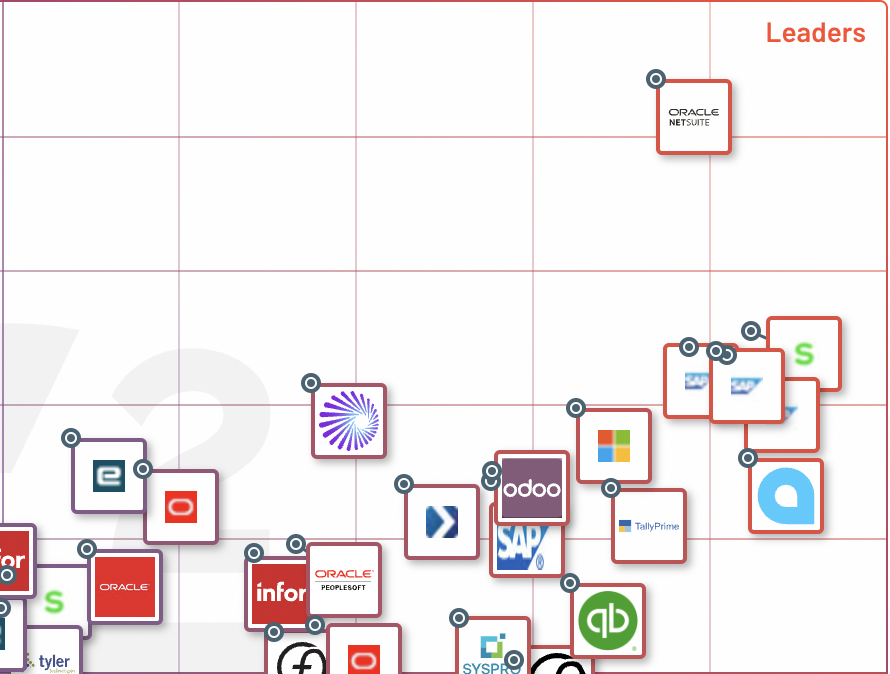
In G2Crowds “Magic Quadrant” NetSuite is ranked number 1 overall. If you’re not familiar with magic quadrants, they’re a great way to tell what the market thinks of an enterprise software solution. The data is based on credible reviews from real customers. The closer your solution is to the top right of the quadrant the better the market is responding to your solution.
Who Uses Oracle NetSuite?
While plenty of large enterprises use the NetSuite platform, according to G2Crowd, SAP still reigns supreme in the upper echelons of business. However, in 2023, NetSuite is hot on their tail. A few years ago SAP’s reign was unchecked. This is not the case in 2023.
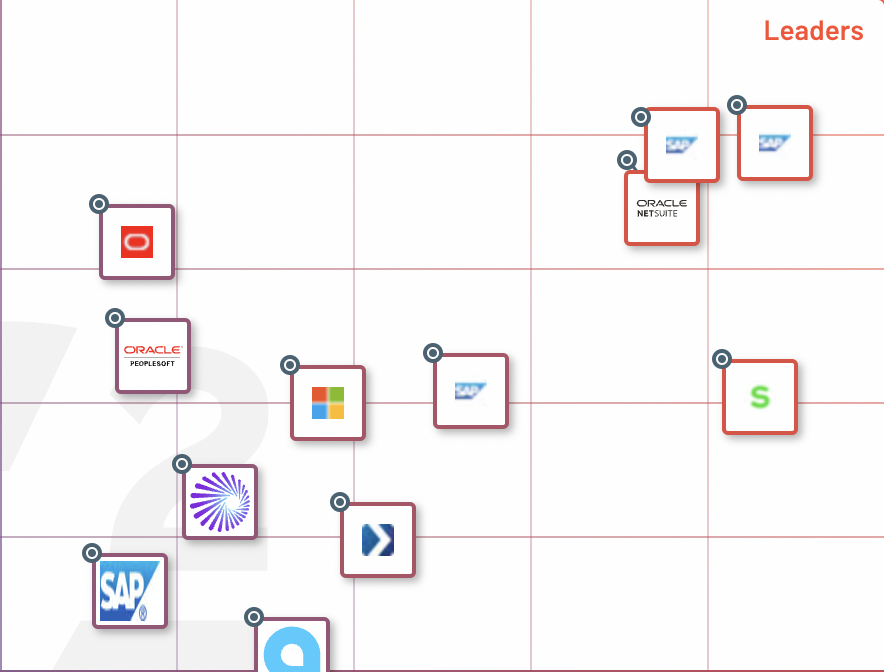
But while NetSuite is happy to be considered a leader in the enterprise category, it really shines in the mid-market and SME segments. Which is logical as many of the advantages of cloud-based solutions apply more specifically to businesses with smaller budgets.
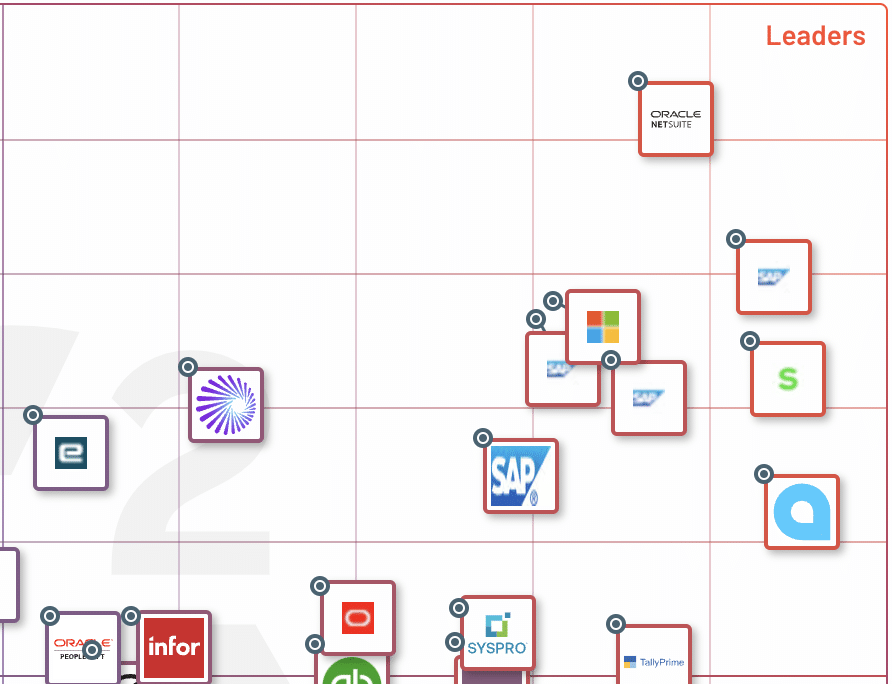
Industry Adoption
NetSuite is flexible enough to be adopted by a number of different industries. However, Computer and Software companies currently dominate the landscape.
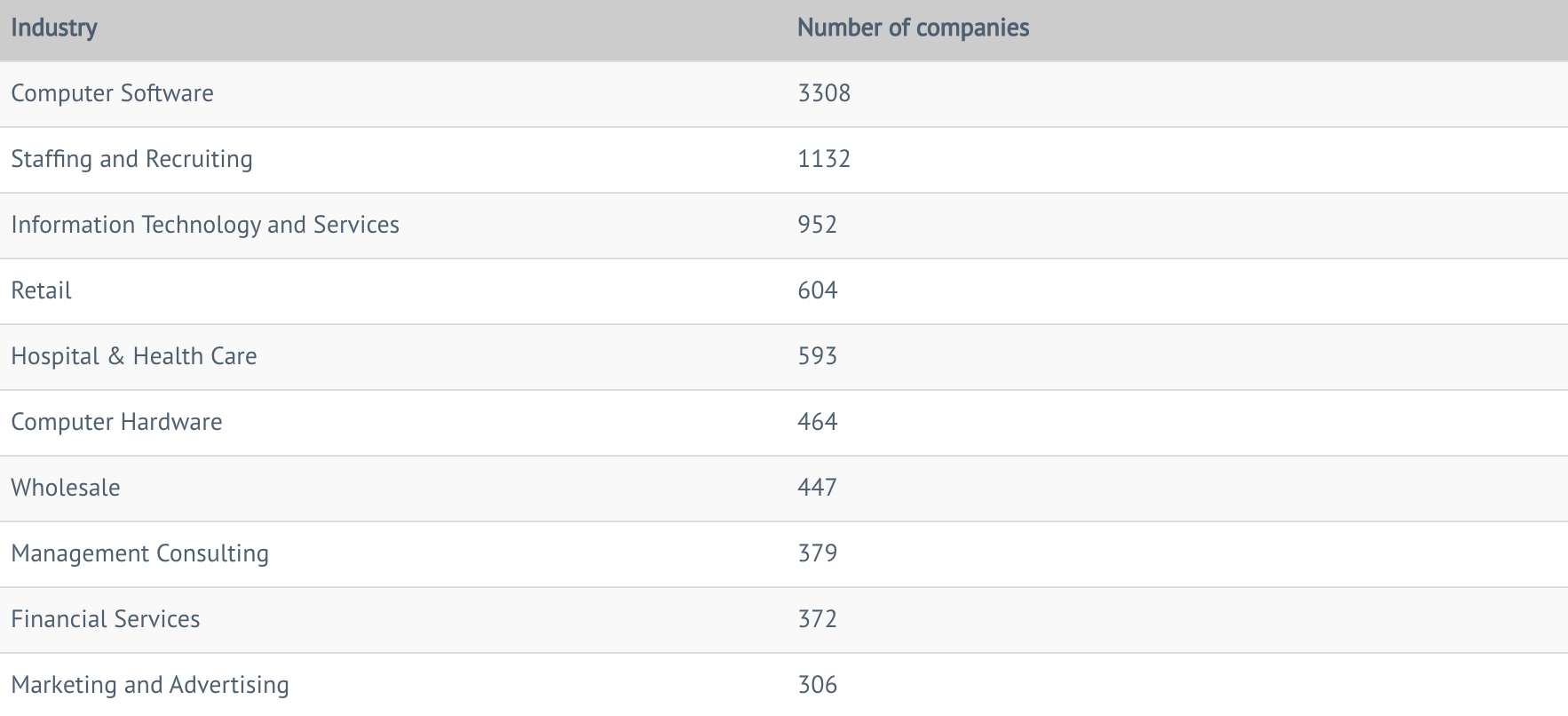
Pricing Model
NetSuite’s pricing model is fairly complex. The pricing for NetSuite’s services is based on a variety of factors, including:
- The specific modules and features you want to use: As we discussed, NetSuite offers a range of modules and features, including financial management, customer relationship management, e-commerce, and supply chain management. The price of your subscription will depend on which modules and features you want to use.
- The number of users: NetSuite pricing is based on the number of users who will be accessing the system. The more users you have, the higher the cost of your subscription will be.
- The length of your contract: NetSuite offers discounts for longer-term contracts, so the length of your contract can affect the price of your subscription.
- Your business size and industry: NetSuite offers different pricing plans for small businesses, mid-sized businesses, and large enterprises, as well as specific pricing plans for certain industries.
- Any customizations or integrations you need: If you need customizations or integrations beyond what is offered out of the box, this may increase the cost of your subscription.
How to Buy NetSuite
In most cases, NetSuite is bought with the help a NetSuite partner that is known as a VAR or Value Added Reseller. Often, would-be NetSuite users are not familiar enough with the NetSuite platform to make optimal decisions during the configuration and implementation phases of the project. These users rely on the VAR to make those decisions for them. Along with consulting fresh NetSuite users, VARs also help negotiate the price of NetSuite, add an extra layer of support to help with user questions, and can do a lot of the heavy lifting with the initial implementation.
Purchases can be made directly through NetSuite. This is only recommended if you have a lot of NetSuite experience aboard your team, are preparing to use the SuiteSuccess program offered by NetSuite, or are planning on doing the NetSuite Implementation alone.
NetSuite Partners
As you could imagine, a platform like NetSuite has attracted quite the community around it. A number of businesses have stepped up to provide additional services and software that benefit NetSuite users. NetSuite has arranged it’s ecosystem of partners in into these categories:
- Solution providers: Solution Providers are companies that sell NetSuite software and solutions to their customers. They may also provide implementation and customization services.
- Alliance Partners: Service providers are companies that offer professional services, such as consulting, implementation, training, and support, to help customers get the most out of their NetSuite software.
- SuiteCloud Development Network (SDN): SDN partners are companies that have developed integrations or customizations that enhance the functionality of NetSuite. These partners may be software vendors, hardware manufacturers, or other technology companies.
- OEM partners: OEM (Original Equipment Manufacturer) partners are companies that incorporate NetSuite functionality into their own products or services.
- Independent software vendors (ISVs): ISVs are companies that develop software applications that run on top of NetSuite. These applications may provide specialized functionality or integrate with other systems.
- Referral partners: Referral partners are companies that refer potential customers to NetSuite. They may receive a commission for successful referrals.
NetSuite Implementation
NetSuite implementation refers to the process of setting up and configuring NetSuite to meet the specific needs of your business. NetSuite implementation typically includes the following steps:
- Planning: During the planning phase, you will work with your NetSuite implementation team to define your business requirements and goals, and to determine how NetSuite can support these goals.
- Customization: During the customization phase, you will work with your team to customize NetSuite to meet your specific business needs. This may involve creating custom fields, forms, and records, integrating with other systems, or using developer tools such as SuiteScript or SuiteFlow.
- Testing: During the testing phase, you will work with your team to test the customized version of NetSuite to ensure that it meets your business requirements and is ready for deployment.
- Deployment: During the deployment phase, you will work with your team to roll out NetSuite to your organization and train users on how to use it.
It is important not to underestimate the implementation of the NetSuite solution. It has been said, the NetSuite platform is only as good as its implementation. The implementation is just as important as the product itself, and it also can be one of the largest up-front costs when purchasing NetSuite. For more information on this subject, check out our guide on NetSuite Implementation.
NetSuite Support
When it comes to getting support for NetSuite. There are currently 4 options:
- Basic Support: NetSuite basic support is included with all subscriptions. It includes access to online resources, such as documentation, FAQs, and knowledge base articles, a Support Community Group, as well as phone support for users who need immediate assistance.
- Premium Support: NetSuite Premium Support is similar to basic, however, it offers priority queueing, weekend support, upgrade notices, and Commerce support.
- Advanced Consumer Report (ACS): NetSuite Advanced Customer Support (ACS) is a premium support offering from NetSuite that provides users with additional resources and support options to help them get the most out of the software and resolve any issues they may have. Some of the features of NetSuite ACS include:
- Priority phone support: ACS users have priority access to phone support, allowing them to receive faster assistance for any issues or questions they may have.
- Dedicated account management: ACS users are assigned a dedicated account manager who is available to help them optimize their use of the software and address any issues or concerns.
- Specialized resources: ACS users have access to specialized resources, such as technical account managers, to help them with more advanced issues or specific business needs.
- Customized training: ACS users can receive customized training to help them get the most out of the software and achieve their business objectives.
- Partner Support: You can also choose to go with a NetSuite partner if you would like a specific type of support. There are plenty of NetSuite partners that offer all kinds of options.
For more information on this subject, check out our guide on NetSuite Support
Resources
Here are some resources that may be helpful for users or potential users of NetSuite:
- NetSuite website: The NetSuite website provides information about the company and its products, including product descriptions, pricing, and case studies. https://www.netsuite.com/
- NetSuite documentation: The NetSuite documentation provides detailed information about how to use the various features and functions of the software. https://docs.netsuite.com/
- NetSuite support: NetSuite offers a range of support options, including online resources, phone support, and community forums. https://www.netsuite.com/portal/support.shtml
- NetSuite training: NetSuite offers various training options, including online courses and instructor-led training, to help users learn how to use the software effectively. https://www.netsuite.com/portal/education.shtml
- NetSuite blogs: The NetSuite blog provides articles and resources on a variety of topics, including best practices, industry insights, and product updates. https://www.netsuite.com/blog/
- NetSuite user groups: There are a number of user groups and communities where NetSuite users can connect with each other and share knowledge and experiences. https://www.netsuite.com/portal/community/user-groups.shtml
- Unofficial User Group: Here is a user group that is not officially tied to NetSuite. This group is helpful for users who are looking for information that is less biased towards partners and the NetSuite company itself. https://www.reddit.com/r/Netsuite/
NetSuite FAQ
What is NetSuite Used For?
NetSuite is a cloud-based business management software that helps organizations manage their financials, operations, and customer relationships. It offers features such as accounting, CRM, inventory management, e-commerce, and more, all in one platform. NetSuite can be used by businesses of all sizes, from small startups to large enterprises, to streamline their processes and improve efficiency.
Is NetSuite the same as Oracle?
NetSuite is owned by Oracle, but it operates as a separate business unit within the company. NetSuite was acquired by Oracle in 2016 and since then has continued to operate independently, providing cloud-based ERP and CRM solutions to its customers.
Why is NetSuite so popular?
NetSuite’s popularity stems from its comprehensive range of business management features, its cloud-based architecture, and its ability to scale and adapt to the needs of growing businesses. With NetSuite, organizations can consolidate their software systems into one platform, streamline their operations, and gain real-time visibility into their financial and operational data.
How much is NetSuite a month?
NetSuite pricing varies depending on the specific needs of each organization. NetSuite offers different pricing packages based on factors such as the number of users, the level of customization, and the specific features required. Organizations can contact NetSuite for a customized quote based on their unique needs.
Is NetSuite easy to learn?
NetSuite can be challenging to learn, especially for users who are not familiar with cloud-based ERP systems. However, NetSuite offers training and certification programs to help users develop the skills and knowledge necessary to effectively use the software. Additionally, NetSuite’s user-friendly interface and customization options make it easier for users to adapt the platform to their specific needs.
What problems does NetSuite solve?
NetSuite solves many common business problems such as inefficient processes, lack of visibility into financial and operational data, and the need to consolidate multiple software systems. With NetSuite, organizations can streamline their operations, improve efficiency, and gain real-time visibility into their data to make better-informed business decisions.
Who are some NetSuite Competitors?
Some of NetSuite’s main competitors include SAP Business One, Microsoft Dynamics 365, Salesforce, Acumatica, and Epicor ERP. These platforms offer similar features such as CRM, accounting, and inventory management, but each has its own unique strengths and weaknesses, making it essential for organizations to carefully evaluate their options before selecting a platform.
Closing Thoughts
In conclusion, NetSuite is a comprehensive enterprise resource planning (ERP) software that offers a range of tools and features for managing financials, operations, and customer relationships. It is designed for businesses of all sizes and industries and provides a range of options for customization and integration. NetSuite also offers a range of support options, including online resources, phone support, and professional services, to help users get the most out of the software and resolve any issues they may have.
If you have any questions about NetSuite or feel that anything in this article is incorrect, please leave a comment. We welcome feedback and are always looking to improve our understanding of this powerful software. If you need help with any NetSuite projects, don’t hesitate to reach out to eMerge Technologies. Our team of experts has a wealth of experience with NetSuite and can assist with implementation, customization, and support.
Jeremy McCourt is an content producer in the enterprise software industry that focuses on NetSuite and related cloud-based software solutions.
Related Posts

NetSuite Training 101 (The 2023 Complete Guide)
NetSuite training is an underrated and often overlooked part of the NetSuite ecosystem. In this article, we do what we can to break down why NetSuite training is a critical part of NetSuite users finding…
- Aug 21
- 6 mins read

What is NetSuite Customization? The 2023 Complete Guide
NetSuite, as a leading cloud-based ERP system, has gained immense popularity among businesses worldwide. However, to truly harness its potential, customization is often necessary. In this comprehensive guide, we delve into the world of NetSuite…
- Aug 16
- 6 mins read

